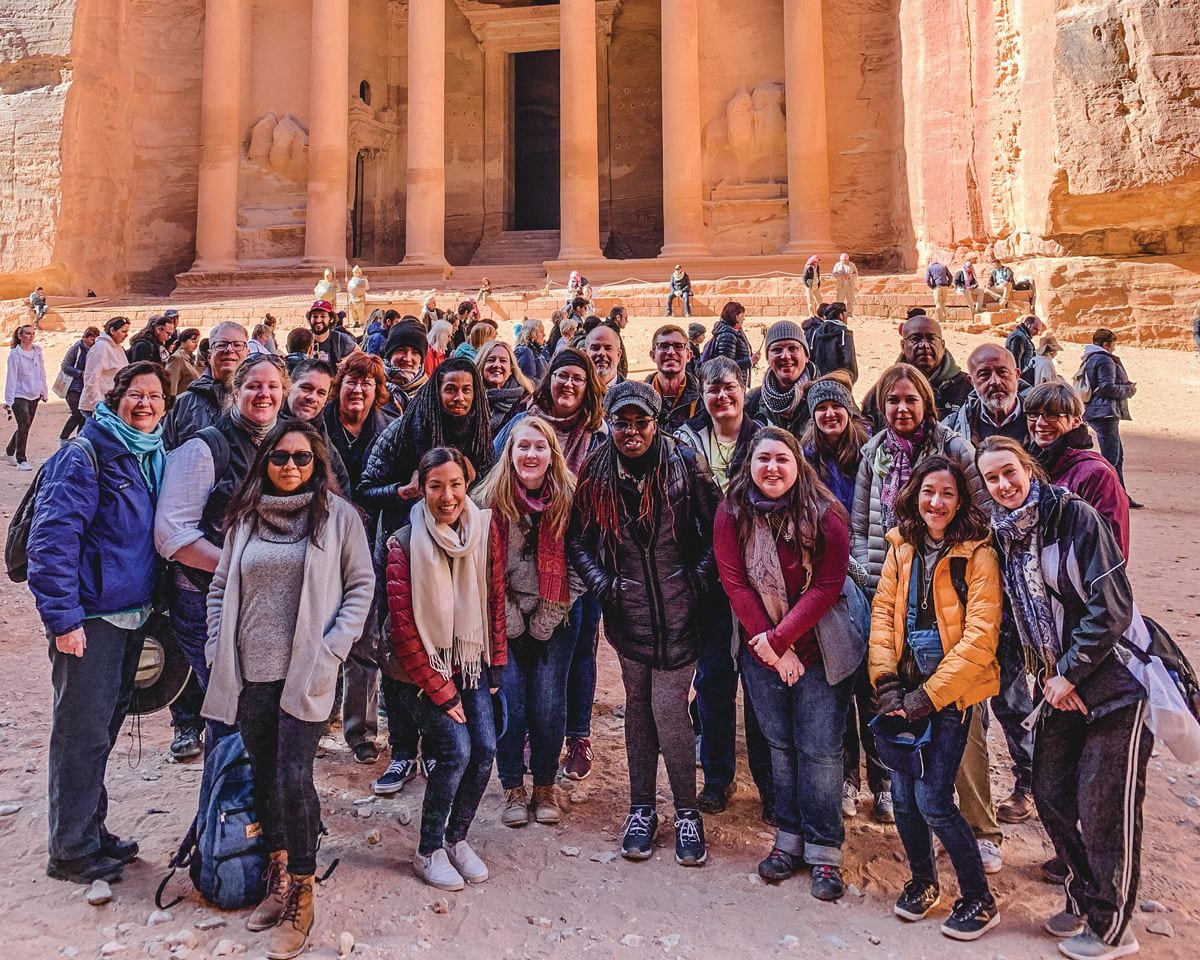As Professor of New Testament, Jaime Clark-Soles’ focus is academic: researching, writing and teaching graduate-level students at Perkins. But she ventures often beyond the seminary to help laypeople cultivate deeper understanding of the Bible, through lectures in churches, at retreats and on study trips.
“I’m out speaking, teaching and preaching to anybody and everybody who’s interested,” said Clark-Soles, Altshuler Distinguished Teaching Professor and Director of the Baptist House of Studies. “Have Bible, will travel.”
Like many Perkins faculty who teach lay audiences, Clark-Soles says the endeavor involves challenges –
all of which she tackles with imagination, enthusiasm and innovative style.
The Priesthood of All Believers
One hurdle in teaching laypeople is limited time.
“With seminary students, I get them for class for 13 weeks,” she said. “We have time to sink into Scripture more deeply, together, and marinate in it all semester long.” Extended time allows her to help students ingrain particular habits of reading and interpreting the Bible.
Teaching laypeople has its perks, too.
“Number one, I don’t have to grade,” she said. “Also, when I teach groups of laypeople, they’re self- selected. Nobody is coming because it’s a required course. They can just jump in and play.”
While she loves teaching laypeople, Clark-Soles is careful to avoid underscoring the dividing line between laity and clergy or theologians.
“I teach the same material to laypeople as I do with seminary students,” she said. “I love teaching all reflective, curious, faithful people who come to learn.” Her classes attract doctors, lawyers, teachers and others – all of whom, she emphasized, are part of the priesthood of all believers.
“I tell them: I’m the expert on the Bible, but I’m not the expert Christian,” Clark-Soles said. “Everybody’s job is to donate their gifts from their perspective.”
Jars of Tears
Ron Watson jokes that he and his wife are “theology groupies” who follow Clark-Soles in the way fans might follow a rock band. Members of North Cross United Methodist Church in Kansas City, the Watsons travel to Dallas each year for the Perkins Summit for Faith and Learning (formerly the Perkins Theological School for the Laity) and previously served on the lay advisory board for the event. They’ve also attended programs taught by Clark-Soles in Taos and Amarillo.
“I’ve lost track of how many actual classes we’ve taken with Jaime, but it’s a bunch,” he said.
Susie Watson treasures two tiny glass jars that Clark-Soles brought back from the Holy Land for lay students in her 2019 “Women in the Bible” class in Dallas. The jars represent Psalm 56:8: “You keep track of all my sorrows. You have collected all my tears in your bottle.” (New Living Translation)
“This is one of the ways that Jaime bridges the gap between ancient Scripture, with an object to hold onto in today’s world,” she said.
Ron Watson notes that Clark-Soles keeps classes lively by veering off her prepared lectures to answer questions spontaneously. Even the course she taught on “Death and Dying” was engaging.
“Jaime used Scripture to dispel a lot of the fear and hellfire/damnation baggage that goes with the topic,” he said. “I left with a much more accepting, natural and comforting perspective on life, death and the hereafter.”
Rhonda Ward, a member of First Fulshear United Methodist Church near Houston, makes an effort to attend the Perkins Lay School in Houston whenever Clark-Soles teaches. That has given Ward a grounding of her Bible knowledge that allows her to teach more effectively in her own church. A lesson on the geography of Palestine, for example, helped her grasp intricacies of the Gospel of Mark.
Just as essential, however, is Clark-Soles’ enthusiasm for the subject.
“Her style, her personality, her joy, all bring the Bible to life,” she said. “She has this endearing, authentic style of being faithful and hopeful.”
Bible Reading Habits
Whatever text or topic she’s teaching, Clark-Soles emphasizes developing good habits of Bible study.
“I want students to build habits of self-awareness of the lens they bring when studying the Bible – to consider the historical context, the translation and its implications, and how to bridge the gap between their own language and the original language,” she said. She also likes to encourage students to sometimes set all that aside, “to forget everything else, read the passage like a story and let the text speak to you as it is.”
While she does occasionally teach a stand-alone Sunday school class, Clark-Soles has gravitated in recent years to more lengthy courses – teaching at weekend retreats, or leading a series of classes, or lecturing on travel adventures, such as the cruise along the Rhine River in December.
“Building community is a hugely important thing for me,” she said. “Scripture was meant to be read in community. That’s difficult with a one-time, 45-minute class.”
Ward adds that Clark-Soles is “not just a deliverer of information. Her approach is, ‘We’re going to grow in this together.’”
That’s by design, Clark-Soles said, because pitfalls arise when individuals study Scripture without community.
“Protestants today are hyper-individualized,” she said. “The danger is a mind-set of, ‘All I need is to be personally saved.’ If the Bible is a privatized thing, your job is done as long as you’ve got yours. But that’s not God’s will. The whole point is the flourishing of all creation.”
